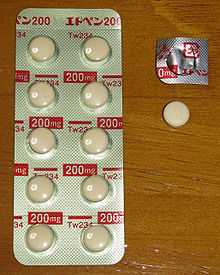Etodolac
 | |
| Systematic (IUPAC) name | |
|---|---|
| (RS)-2-(1,8-Diethyl-4,9-dihydro-3H-pyrano[3,4-b]indol-1-yl)acetic acid | |
| Clinical data | |
| AHFS/Drugs.com | monograph |
| MedlinePlus | a692015 |
| |
| |
| oral | |
| Pharmacokinetic data | |
| Protein binding | 100% |
| Metabolism | liver |
| Half-life | 7.3 ± 4.0 hours |
| Excretion | renal |
| Identifiers | |
|
41340-25-4 | |
| M01AB08 | |
| PubChem | CID 3308 |
| DrugBank |
DB00749 |
| ChemSpider |
3192 |
| UNII |
2M36281008 |
| KEGG |
D00315 |
| ChEBI |
CHEBI:4909 |
| ChEMBL |
CHEMBL622 |
| Chemical data | |
| Formula | C17H21NO3 |
| 287.35 g/mol | |
|
SMILES
| |
| |
| Physical data | |
| Melting point | 145 to 148 °C (293 to 298 °F) |
| 3.92e-02 mg/mL [ALOGPS] mg/mL (20 °C) | |
| | |

Etodolac is a nonsteroidal anti-inflammatory drug (NSAID) approved by the U.S. Food and Drug Administration in January 1991.[1]
Action
NSAIDs are used for the management of mild to moderate pain, fever, and inflammation. They work by reducing the levels of prostaglandins, which are chemicals that are responsible for pain and the fever and tenderness that occur with inflammation. Etodolac blocks the cyclooxygenase (abbrev. COX) enzymes which form prostanoids, resulting in lower concentrations of prostaglandins. As a consequence, inflammation, pain and fever are reduced.
Post-marketing studies demonstrated that etodolac inhibition of cyclooxygenase is somewhat COX-2 selective [2] similar to celecoxib and other "COX-2 inhibitors." Unlike rofecoxib, both etodolac and celecoxib can fully inhibit COX-1 and are designated as having "preferential selectivity" toward COX-2. The (inactive against COX) r-enantiomer of etodolac inhibits beta-catenin levels in hepatoma cells.[3]
Indications
Etodolac is licensed for the treatment of inflammation and pain caused by osteoarthritis and rheumatoid arthritis.[4]
Interactions
Etodolac should be avoided by patients with a history of asthma attacks, hives, or other allergic reactions to aspirin or other NSAIDs. Rare but severe allergic reactions have been reported in such individuals. It also should be avoided by patients with peptic ulcer disease or poor kidney function, since this medication can worsen both conditions. Etodolac is used with caution in patients taking blood thinning medications (anticoagulants), such as warfarin (Coumadin), because it increases the risk of bleeding. Patients taking both lithium and etodolac may develop toxic blood lithium levels. Additionally, etodolac has been found to interact with certain anti-depressant medications, such as sertraline or fluoxetine, which can increase risks of stroke, heart attack, and other cardiovascular conditions. Patients also taking ciclosporin (Sandimmune) can develop kidney toxicity. Use in children has not been adequately studied. Etodolac is not habit-forming. NSAIDs should be discontinued prior to elective surgery because of a mild interference with clotting that is characteristic of this group of medicines. Etodolac is best discontinued at least four days in advance of surgery.
Persons who have more than 3 alcoholic beverages per day are at increased risk of developing stomach ulcers when taking etodolac or other NSAIDs.

Pregnancy and nursing
Etodolac is generally avoided during pregnancy and nursing. NSAIDs may cause adverse cardiovascular effects in the fetus during pregnancy. [1]
Side effects
Etodolac may cause side effects, or adverse drug reactions. It is advised to contact a physician if any of these symptoms are severe or persistent: Constipation, diarrhea, gas or bloating, vomiting, headache, dizziness, ringing in the ears, runny nose, sore throat, blurred vision.
Some side effects can be serious. It is advised if any of the following symptoms occur to immediately contact a physician, and to discontinue use until such a time:
Unexplained weight gain, swelling of the eyes, face, lips, tongue, throat, hands, feet, ankles, or lower legs, fever or chills, blisters, rash, itching, hives, hoarseness, difficulty breathing or swallowing, yellowing of the skin or eyes, excessive tiredness, unusual bleeding or bruising, lack of energy, loss of appetite, pain in the upper right part of the stomach, flu-like symptoms, pale skin, fast heartbeat, cloudy, discolored, or bloody urine, difficult or painful urination, back pain.
Brand names
Etodolac is manufactured by Almirall Limited under the trade name Lodine SR[5] and by Meda Pharmaceuticals under the name Eccoxolac.[6] Non-proprietary etodolac is also available [7]
The drug is also sold under several other brand names, including:
- Etova (India)
- Dualgan (Portugal)
- Etodin (South Korea)
- Etofree (India)
- Etopan (Israel)
- Flancox®[8] (Brazil)
- Haipen (Japan)
- Lodine (France, Switzerland)
- Proxym (S Etodolac) (India)
- Etol (Turkey)
- Lonine (Taiwan)
References
- ↑ 1.0 1.1 http://www.medicinenet.com/etodolac/article.htm
- ↑ http://www.pnas.org/content/96/13/7563.short
- ↑ Behari, J; Zeng, G; Otruba, W; Thompson, MD; Muller, P; Micsenyi, A; Sekhon, SS; Leoni, L; Monga, SP (2007). "R-Etodolac Decreases Beta-Catenin Levels Along with Survival and Proliferation of Hepatoma Cells". Journal of hepatology 46 (5): 849–57. doi:10.1016/j.jhep.2006.11.017. PMC 1924913. PMID 17275129.
- ↑ BNF 55 - Etodolac
- ↑ Summary of Product Characteristics Lodine SR
- ↑ Summary of Product Characteristics Eccoxolac
- ↑ BNF 55: Etodolac preparations
- ↑ http://www.apsen.com.br/bula.php?id_bula=5
External links
| Wikimedia Commons has media related to Etodolac. |
| ||||||||||||||||||||||||||||||||||||||||||||||||||||||||
| ||||||||||||||||||||||||||||||||||||||||||||||||||||||||||||||||||||||||||||||||||||||||||||||||||||||